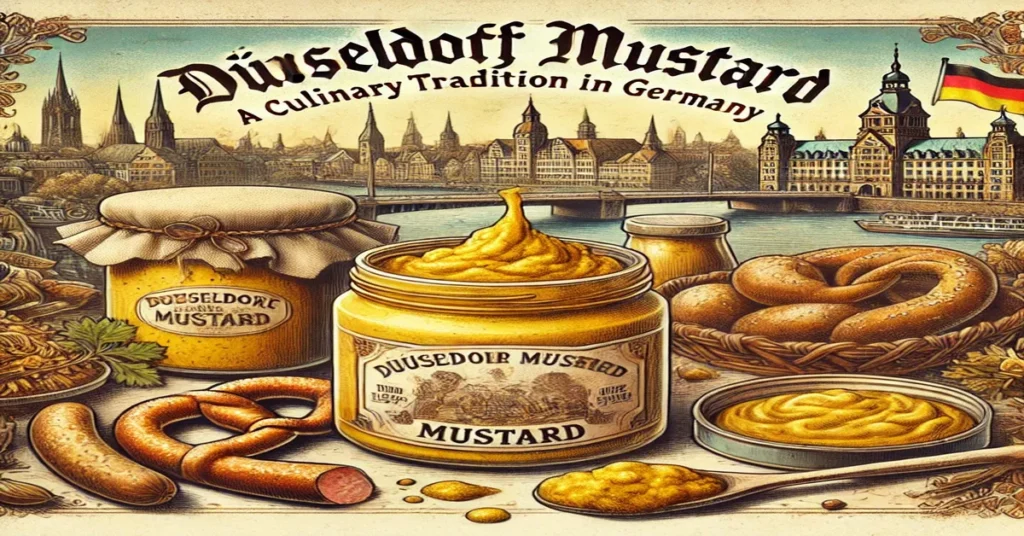Introduction
- Düsseldorf Mustard: A Culinary Tradition in Germany Brief introduction to Düsseldorf mustard, its importance in German culture, and its unique taste profile.
- Comparison to other mustard varieties such as Dijon and Bavarian mustard.
History and Origins of Düsseldorf Mustard
- Düsseldorf Mustard: A Culinary Tradition in Germany The origins of mustard production in Düsseldorf.
- Düsseldorf’s location along the Rhine and its role in facilitating trade, including the spice trade that brought mustard seeds to the area.
- How Düsseldorf mustard became a symbol of the city and a staple in German households.
Traditional Methods of Production
- The ingredients typically used in Düsseldorf mustard: brown or black mustard seeds, vinegar, spices.
- The “cold grinding” technique traditionally used to preserve the flavor and pungency.
- Differences in production compared to other types of mustard.
Flavor Profile of Düsseldorf Mustard
- Detailed description of the taste: sharp, tangy, slightly bitter, and how it complements various foods.
- Explanation of how black mustard seeds contribute to its unique pungency.
- Comparison of flavor with other German mustards and international varieties.
Düsseldorf vs. Other Mustards: What Sets It Apart
- Comparison with other popular German mustards: sweet Bavarian mustards, spicy Dijon, and mild American yellow mustard.
- How Düsseldorf mustard is used in local cuisine versus other types of mustard.
- Unique aspects of Düsseldorf mustard, such as its heat level and grainy texture.
Cultural Significance of Mustard in Düsseldorf
- Mustard as an integral part of Düsseldorf’s local cuisine and culture.
- Düsseldorf’s mustard museum: its history, significance, and role in preserving the mustard-making tradition.
- How mustard is celebrated in Düsseldorf festivals and culinary events.
Popular Brands and Varieties
- Introduction to popular Düsseldorf mustard brands such as ABB Senf and Löwensenf.
- Different varieties within Düsseldorf mustard: mild, spicy, and extra spicy.
- Specialty flavors and limited editions that sometimes appear.
Using Düsseldorf Mustard in Cooking
- Traditional German recipes that incorporate Düsseldorf mustard: sausages, sauerkraut, potato salad.
- How Düsseldorf mustard enhances flavors in marinades, dressings, and sauces.
- Contemporary recipes and fusion dishes that feature Düsseldorf mustard.
Health Benefits of Mustard
- Nutritional profile of mustard: low-calorie, low-fat, rich in antioxidants, vitamins, and minerals.
- Health benefits associated with mustard seeds: digestion aid, anti-inflammatory properties, and rich in phytonutrients.
- Importance of mustard as a healthier condiment option.
How to Store and Preserve Düsseldorf Mustard
- Tips for storing mustard to retain flavor and freshness: refrigeration, sealing properly, and shelf-life expectations.
- How long Düsseldorf mustard lasts compared to other mustards.
Where to Buy Düsseldorf Mustard
- Options for buying Düsseldorf mustard: supermarkets, specialty stores, and online options.
- Tips for choosing the right variety and brand, especially for those new to Düsseldorf mustard.
Conclusion
- Recap of the key points about Düsseldorf mustard and its unique place in German and global cuisine.
- Encouragement for readers to try Düsseldorf mustard for an authentic German culinary experience.
FAQs
1. What makes Düsseldorf mustard different from Dijon mustard?
Düsseldorf mustard uses black or brown mustard seeds, resulting in a stronger, more pungent flavor than Dijon mustard. Dijon typically has a smoother consistency and a more delicate taste profile.
2. Can I substitute Düsseldorf mustard for other types of mustard in recipes?
Yes, but keep in mind its strong flavor. Düsseldorf mustard is ideal in recipes where a bold, spicy taste is desired. For milder dishes, you may want to adjust quantities.
3. Is Düsseldorf mustard healthy?
Yes, it is low in calories and fat while being rich in antioxidants, vitamins, and minerals. It also contains compounds that may support digestion and reduce inflammation.
4. How should Düsseldorf mustard be stored?
It should be stored in a cool, dark place before opening. Once opened, refrigerate it to retain freshness and flavor for longer.
5. Where can I buy authentic Düsseldorf mustard?
Düsseldorf mustard is available in specialty stores, some well-stocked supermarkets, and online. Look for brands like ABB Senf or Löwensenf for authentic options.
6. Can I use Düsseldorf mustard in non-German recipes?
Absolutely! Düsseldorf mustard’s bold flavor pairs well with a variety of dishes, including dressings, marinades, and even as a dip for meats and vegetables.

